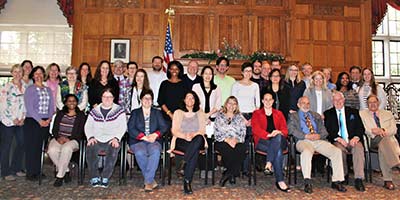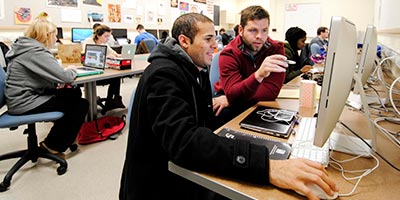Faculty & Faculty Advisors
Importance of Good Advising
Students may create strong bonds with you as teachers and researchers, but only in advising will you be able to form and build relationships that last through a student's full career at West Chester. It has been shown that students' potential for success - doing well in classes, moving through their programs smoothly, graduating on time - is dramatically increased if they can form solid interpersonal relationships with mentors on campus. Thus, advising can make a huge difference, and faculty advisors must consider this important opportunity for positive impact from their first meeting with their advisees. Many faculty advisors report, too, that building close relationships with advisees is what they enjoy most about their faculty responsibilities.
Resources
- General Education Guides:
Advising Special Populations
- Athletes
- First-Generation
- At-Risk Students
- Transfer Students
Legal Responsibilities as an Advisor
- Family Educational Rights and Privacy Act (FERPA) (all accordion style)
You may not release any student academic information to anyone outside the university without written permission by the student. - Mandatory Title IX Reporting
You must report to the Office of Equal Opportunity and Compliance any incident of sexual misconduct that is told to you by an advisee, and you must provide your advisee's name. Please make sure your advisees are aware that anything of this nature they tell you must be reported. If your advisee does not want his or her information reported under his/her name, s/he can speak to employees with confidential exemption:-
- Counseling Center
- Student Health Services
- Students can also report using a confidential online form
-
- Crisis Response and Resources
You may become aware of troubling persons or situations that cause serious anxiety, stress or fear. You should report such situations immediately to your chair and Public Safety. You will rarely encounter threatening situations at the university, and you are not expected to be experts in responding to such issues, but you do need to report anything of concern.
Best Practices for Virtual Advising
- This Virtual Advising Guide will help you maintain a good advising relationship with your advisees.
Advising Expectation
- Academic advising is an educational partnership between a faculty member and a student whose goal is the student's academic, personal, and professional success. Advisors and advisees collaborate to help students achieve their aims. Advisors explain policies, identify resources, and give advice; however, students are ultimately responsible for making the decisions that will keep them on track. The advising relationship thus mirrors other teaching relationships at West Chester University.
- At WCU, advisors and advisees: (Good Advising: A Shared Responsibility Chart)
- Treat each other with respect
- Understand their advising duties
- Work to clarify students' professional and life goals
- Contribute to realistic academic and career plans
- Educate themselves about institutional policies, procedures, and opportunities
- Contribute to making good class choices
- Address challenges through knowledge and use of campus resources
- Use available technological tool



